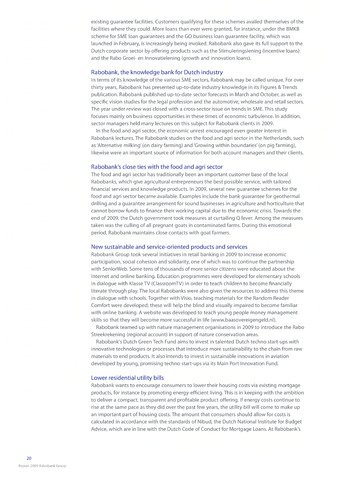existing guarantee facilities. Customers qualifying for these schemes availed themselves of the
facilities where they could. More loans than ever were granted, for instance, under the BMKB
scheme for SME loan guarantees and the GO business loan guarantee facility, which was
launched in February, is increasingly being invoked. Rabobank also gave its full support to the
Dutch corporate sector by offering products such as the Stimuleringslening (incentive loans)
and the Rabo Groei- en Innovatielening (growth and innovation loans).
Rabobank, the knowledge bank for Dutch industry
In terms of its knowledge of the various SME sectors, Rabobank may be called unique. For over
thirty years, Rabobank has presented up-to-date industry knowledge in its Figures &Trends
publication. Rabobank published up-to-date sector forecasts in March and October, as well as
specific vision studies for the legal profession and the automotive, wholesale and retail sectors.
The year under review was closed with a cross-sector issue on trends in SME. This study
focuses mainly on business opportunities in these times of economic turbulence. In addition,
sector managers held many lectures on this subject for Rabobank clients in 2009.
In the food and agri sector, the economic unrest encouraged even greater interest in
Rabobank lectures. The Rabobank studies on the food and agri sector in the Netherlands, such
as 'Alternative milking' (on dairy farming) and 'Growing within boundaries' (on pig farming),
likewise were an important source of information for both account managers and their clients.
Rabobank's close ties with the food and agri sector
The food and agri sector has traditionally been an important customer base of the local
Rabobanks, which give agricultural entrepreneurs the best possible service, with tailored
financial services and knowledge products. In 2009, several new guarantee schemes for the
food and agri sector became available. Examples include the bank guarantee for geothermal
drilling and a guarantee arrangement for sound businesses in agriculture and horticulture that
cannot borrow funds to finance their working capital due to the economic crisis. Towards the
end of 2009, the Dutch government took measures at curtailing Q fever. Among the measures
taken was the culling of all pregnant goats in contaminated farms. During this emotional
period, Rabobank maintains close contacts with goat farmers.
New sustainable and service-oriented products and services
Rabobank Group took several initiatives in retail banking in 2009 to increase economic
participation, social cohesion and solidarity, one of which was to continue the partnership
with SeniorWeb. Some tens of thousands of more senior citizens were educated about the
Internet and online banking. Education programmes were developed for elementary schools
in dialogue with Klasse TV (ClassroomTV) in order to teach children to become financially
literate through play.The local Rabobanks were also given the resources to address this theme
in dialogue with schools.Together with Visio, teaching materials for the Random Reader
Comfort were developed; these will help the blind and visually impaired to become familiar
with online banking. A website was developed to teach young people money management
skills so that they will become more successful in life (www.baasovereigengeld.nl).
Rabobank teamed up with nature management organisations in 2009 to introduce the Rabo
Streekrekening (regional account) in support of nature conservation areas.
Rabobank's Dutch Green Tech Fund aims to invest in talented Dutch techno start-ups with
innovative technologies or processes that introduce more sustainability to the chain from raw
materials to end products. It also intends to invest in sustainable innovations in aviation
developed by young, promising techno start-ups via its Main Port Innovation Fund.
Lower residential utility bills
Rabobank wants to encourage consumers to lower their housing costs via existing mortgage
products, for instance by promoting energy-efficient living. This is in keeping with the ambition
to deliver a compact, transparent and profitable product offering. If energy costs continue to
rise at the same pace as they did over the past few years, the utility bill will come to make up
an important part of housing costs. The amount that consumers should allow for costs is
calculated in accordance with the standards of Nibud, the Dutch National Institute for Budget
Advice, which are in line with the Dutch Code of Conduct for Mortgage Loans. At Rabobank's
20
Report 2009 Rabobank Group

